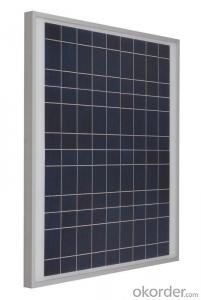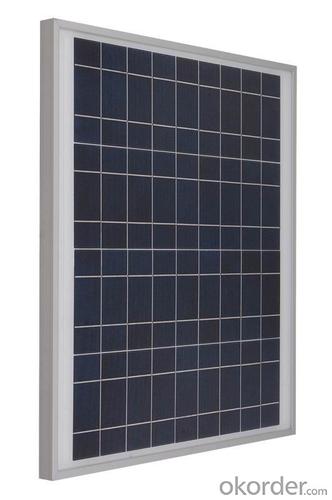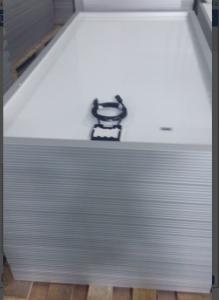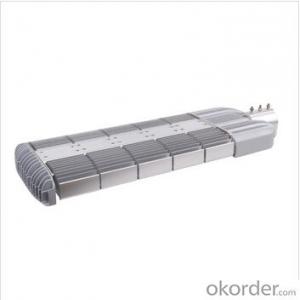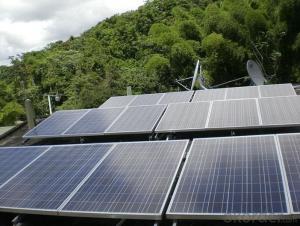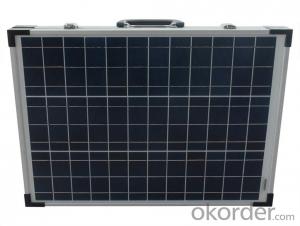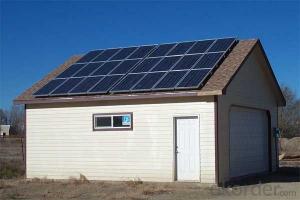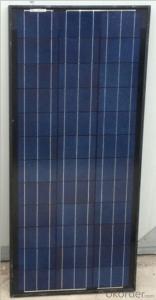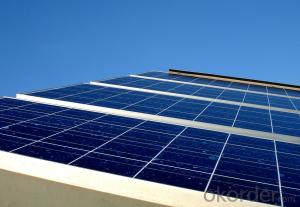Solar Panels Qld - 100Wp Polycrystalline Solar PV Modules with Top Quality
- Loading Port:
- Tianjin
- Payment Terms:
- TT OR LC
- Min Order Qty:
- 1000 watt
- Supply Capability:
- 10000000 watt/month
OKorder Service Pledge
OKorder Financial Service
You Might Also Like
Specification
Product Description
Key Specifications/Special Features
Specifications:
Number of cells: 36 pieces
Solar panels maximum power: 100W
Output tolerance: +3%
Optimum power voltage (Vmp): 18.01V
Optimum operating current (Imp): 5.56A
Open circuit voltage (Voc): 21.05V
Short circuit current (Isc): 7.94A
Solar cell efficiency: 11.76%
Solar PV module efficiency: 10.16%
Solar panels size: 1120 x 680 x 30mm
Frame:
Type: anodized
Material: aluminum alloy
Thickness: 30mm
3-piece by pass Schottky diode: 10A
Cable: TUV-certified cable 90cm length
Maximum system voltage: 1,000V
Solar panels features:
TUV, MCS, CEC, IEC61215, IEC61730, CE and UL approved solar panels
Long lifespan: 25 years lifetime guarantee, 12 years workshop warranty, 90% output in first 10 years, 85% output in next 15 years
Solar panels are withstand extreme working condition (from -40to 120°C)
Salt protected (coastal area workable)
Solar panels output: positive tolerance 0-10Wp
Custom-made available
Grade A solar panels rated by TUV
High transformation efficiency solar panels
New UV reflector protected layer
Maintenance-free solar panels
No exposed metal parts
100% EL test before and after laminator for each solar panels
CHUBB insurance company to guarantee the quality of solar panels
Bankable solar panel in Germany, Italy, UK and Denmark
Applications:
On-grid or off-grid solar power stations
1MW solar power solar power stations
Commercial and industrial building roof-top systems
Home and official appliances power supply solar systems
Power supply for traffic, security, gas industry
12V, 24V, 48V and 96V battery charging system
Material of solar panels:
High transmission tempered 3MW costing glass, hailstone resistance
TPT imported from Krempel, Brightsone and 3M
Rugged design to withstands high wind pressure and snow load, easy to install
Smart junction box with built-in diode prevents reverse charging
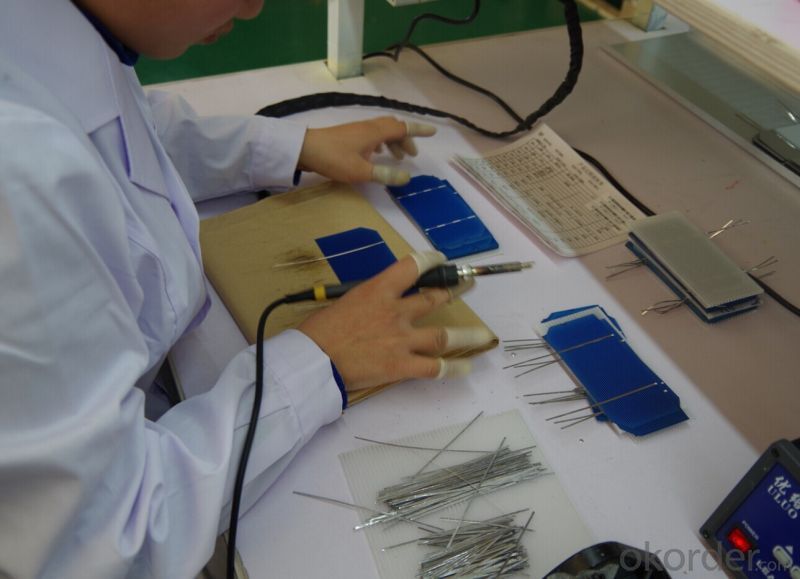
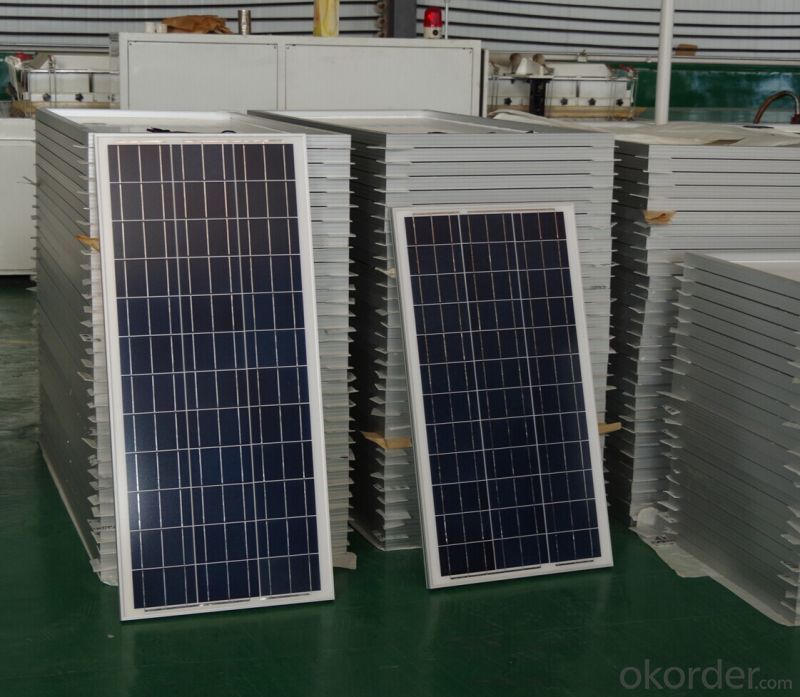
Product Details
| Electrical Data | Module Size | Weight | Number of cells series | ||||
| Nominal Power | Max-Power | Max-Power | Open-Circuit | Short-Circuit | |||
| Voltage | Current | Voltage | Current | ||||
| Pmax | VMPP | IMPP | VOC | ISC | |||
| W | V | A | V | A | mm | Kg | pc |
| 10 | 17.2 | 0.58 | 21.6 | 1.31 | 340*254*17 | 1.2 | 36 |
| 20 | 17.2 | 1.16 | 21.6 | 1.93 | 340*460*25 | 1.8 | 36 |
| 30 | 17.2 | 1.74 | 21.6 | 2.57 | 350*670*30 | 3 | 36 |
| 40 | 17.2 | 2.32 | 21.6 | 3.23 | 450*670*30 | 3.5 | 36 |
| 50 | 17.2 | 2.91 | 21.6 | 3.86 | 550*670*30 | 4.5 | 36 |
| 60 | 17.2 | 3.49 | 21.6 | 3.86 | 603*670*30 | 5.3 | 36 |
| 70 | 17.2 | 4.07 | 21.6 | 4.51 | 758*670*30 | 6 | 36 |
| 80 | 17.2 | 4.65 | 21.6 | 5.17 | 758*670*30 | 6.5 | 36 |
| 90 | 17.2 | 5.23 | 21.6 | 5.81 | 935*670*30 | 6.7 | 36 |
| 100 | 17.2 | 5.8 | 21.6 | 6.46 | 935*670*30 | 6.7 | 36 |
| 110 | 17.2 | 6.4 | 21.6 | 7.08 | 1061*670*35 | 8 | 36 |
| 120 | 17.2 | 6.98 | 21.6 | 7.72 | 1161*670*35 | 8.6 | 36 |
| 130 | 17.2 | 7.56 | 21.6 | 8.4 | 1277*670*35 | 9.8 | 36 |
| 140 | 17.2 | 4 | 21.6 | 4.4 | 1480*670*35 | 10.9 | 36 |
| 150 | 17.2 | 4.17 | 21.6 | 4.58 | 1480*670*35 | 10.9 | 36 |
| 160 | 34.4 | 4.65 | 43.2 | 5.17 | 1480*670*35 | 10.9 | 72 |
| 170 | 34.4 | 4.94 | 43.2 | 5.49 | 1172*983*35 | 11.7 | 72 |
| 180 | 34.4 | 5.23 | 43.2 | 5.81 | 1172*983*35 | 11.7 | 72 |
| 190 | 34.4 | 5.52 | 43.2 | 6.14 | 1260*983*35 | 14.6 | 72 |
| 200 | 34.4 | 5.81 | 43.2 | 6.5 | 1260*983*35 | 14.6 | 72 |
| 210 | 34.4 | 6.1 | 43.2 | 6.85 | 1488*983*35 | 14.6 | 72 |
| 220 | 34.4 | 6.4 | 43.2 | 7.08 | 1488*983*35 | 15.2 | 72 |
- Q: Can solar panels be installed on vehicles?
- Yes, solar panels can be installed on vehicles. They are commonly used on electric cars, boats, and recreational vehicles to harness solar energy and help charge their batteries.
- Q: My mom's house has some solar power panels on the top of her house but they are not connected to anything. They don't even have wires or anything like that. Does anyone know how to connect and make solar panels work? Thank You
- Call a local solar company (a company that sells and installs solar panels). If you're having trouble finding one, you can call your local power company and they'll probably know of some. Have them come to your house and take a look at the panels and figure out what it would take to complete the installation.
- Q: I have a small marine solar panel on my boat It came with the boat. I want to make sure it is working before I connect it. With a volt meter It is only reading .2 volts dc. I would think it should be 2-5 volts?
- Mark, the 2 vdc is pretty typical. Most panels for home use are set up to charge 2 volt batteries, and they are wired for an, open circuit voltage of 8 to 9 volts. This allows it to have enough voltage to feed through a few diodes, perhaps a charge controller and 30 or 40 feet of wire and still have at least 5 volts left over. Once you connect it to the battery the panel will drop to whatever the batteries charging curve voltage would be. If you have a few minutes, I would suggest getting a book at the library called, The Complete Battery Book, by Richard Perez. Just read the chapters pertaining to lead acid batteries, the other discussions on lithium, ni cads and such won't apply to your boat system. If your panel is not large, and it's short circuit current rating in amps is less than 2% of the amp hour capacity of the battery, you can even run the panel without a charge controller. The book explains this as well. There is a great magazine that gets into the nuts and bolts of this stuff, it's called Home Power, you can find it online. You might also find some info at a couple renewable energy websites, I will list them below. Panels are rated in two ways, open circuit voltage, which you measure with a multimeter while the panel is in open sun and nothing is connected to it. The other rating is short cirucuit current, which you measure with an ammeter while the panel is in the sun as well. You connect the ammeter across the output of the panel and let all the power short right through the meter, so you'll need an ammeter big enough to handle more amps than the panel puts out. A 0 amp unit will work for your boat panel. These tests won't hurt the panel, or the meters, we do it all the time in the field, and the manufacturers will tell you to do the same test if you have a problem with a panel and they want to know if it's malfunctioning. You can check one of their websites if you like. Good luck Mark, and take care, Rudydoo
- Q: Can solar panels be installed on water pumps?
- Yes, solar panels can be installed on water pumps. Solar-powered water pumps are becoming increasingly popular and are a sustainable solution for providing water in remote areas or off-grid locations. These pumps use solar energy to power their operation, making them environmentally friendly and cost-effective in the long run.
- Q: i don't know very much about it, but can you somehow take off the little solar panels off of the outdoor light things and make it so you can hook an outlet up to it and plug in to it like a phone charger for electricity.
- Little solar panels on lights are very low power. The battery in one such may be 0.5 Amp-hours and .2 V ; it may be different but it should be marked on the panel/battery/manual. An outlet in your house is designed to run on 20 V (typically in N. Am.) and they run on alternating current (AC) whereas the panel generates direct current (DC). (If you don't know the difference, do not worry to much but just understand that they are not directly compatible.) You therefore need an inverter to change DC to AC (and lose some although inverters are now very efficient). But the amount of power generated by those panels is still very small. That is why solar lights are low power (just a few watts in most cases). To make things even more irritating, phone chargers do not work off 20 V AC as you are charging the battery and need a low voltage DC -- which is what the solar panel is giving you. It is almost certain that the voltage from the panel will be less than the voltage required for the phone. The charger is mostly cable but there is a black box incorporated and it should say what the voltage and current output are (the input will be 20V). So you should be able to overcome this not by hooking up the panel to a 20V outlet and then plugging the charger in but by hooking up the panel to the phone directly if you can get enough voltage out of the solar panel (or hook up several) and if you fashion a connection device. They already make them -- solar battery chargers and I am sure you can enter that into a search engine and find loads. Typically the panel alone is much more than a solar light -- which shows the relative power requirements.
- Q: Can solar panels be used to power a shopping mall?
- Yes, solar panels can be used to power a shopping mall. By installing a sufficient number of solar panels on the roof or surrounding areas of the mall, it is possible to generate enough electricity to meet a significant portion, if not all, of its power needs. This renewable energy source can reduce the mall's reliance on traditional electricity sources and contribute to a more sustainable and environmentally friendly operation.
- Q: Interested in buying solar panels to save on electric bill.Any government help plans?
- Check with your Power Company, ours has had several $$$ Incentive Programs that they get involved with,Federal,State,and Private Sector. Just about anything High efficiency or Electrical saving,including Solar.
- Q: I wanna start going green, you know like solar panels, wind turbines, etc. but where I live the companies that install the free solar panels in exchange for the subsidiaries aren't available. To start off I was just looking for a single panel I could drill into my roof and wire it to an outlet just for small thinks like charging my phone and a fan maybe. If anybody can understand my crazy idea please answer with links to where I can find these things. Thanks!
- That's okorder /
- Q: i really need to know howbecause im building a solar powered car for science fair :]thank you!
- get some stuff, put it on the other stuff
- Q: I have an off-grid 24volt existing system using 8 x 80 watt 2volt, wired at 24volts, mono solar panels with deep cycle batteries,operating now. I have been given a 240 2volt polly cryst. panel. Can I add this panel to existing panels as above. Thank you, dumb solar man
- Assuming that you have / will upgrade wiring sizes to carry the extra wattage, that the new total wattage resulting from the addition doesn't overload any existing charge controller, diodes and / or inverter you have installed, then paralleling it straight into one of the other 2 volt groups should do nothing but add current to the system. True, it will be somewhat imbalanced, but it will work. Your other options would be to reconfigure everything down to it's native 2 V configuration which will raise current and lower voltage, with the additional panel creating the additional current to raise the wattage or to put it in series with the other 4 panel clusters so that you would get 36 V and additional current to account for the raised wattage. One last approach might be to set it up on another battery bank of it's own (small and at 2 V) to then connect to the same inverter. You'd be getting more power and storage capability that way, sort of a partial backup system, really, that will take some of the load off the other components to help extend their useful lives and get a bit more flexibility into it as well. The choice is yours here. That is all the ways that the system can be connected in, assuming everything in the first sentence checks out;-) It's difficult to make a recommendation without knowing what other components are in use and what the maximum ratings they carry are. Just remember that parallel connections add current and voltage stays the same, series connections add voltage and the current remains the same and you can figure out what to do with this thing to help you if you stay within maximum ratings for the charge controller, diodes and / or inverter involved. Good luck and stay safe!
Send your message to us
Solar Panels Qld - 100Wp Polycrystalline Solar PV Modules with Top Quality
- Loading Port:
- Tianjin
- Payment Terms:
- TT OR LC
- Min Order Qty:
- 1000 watt
- Supply Capability:
- 10000000 watt/month
OKorder Service Pledge
OKorder Financial Service
Similar products
Hot products
Hot Searches
Related keywords
